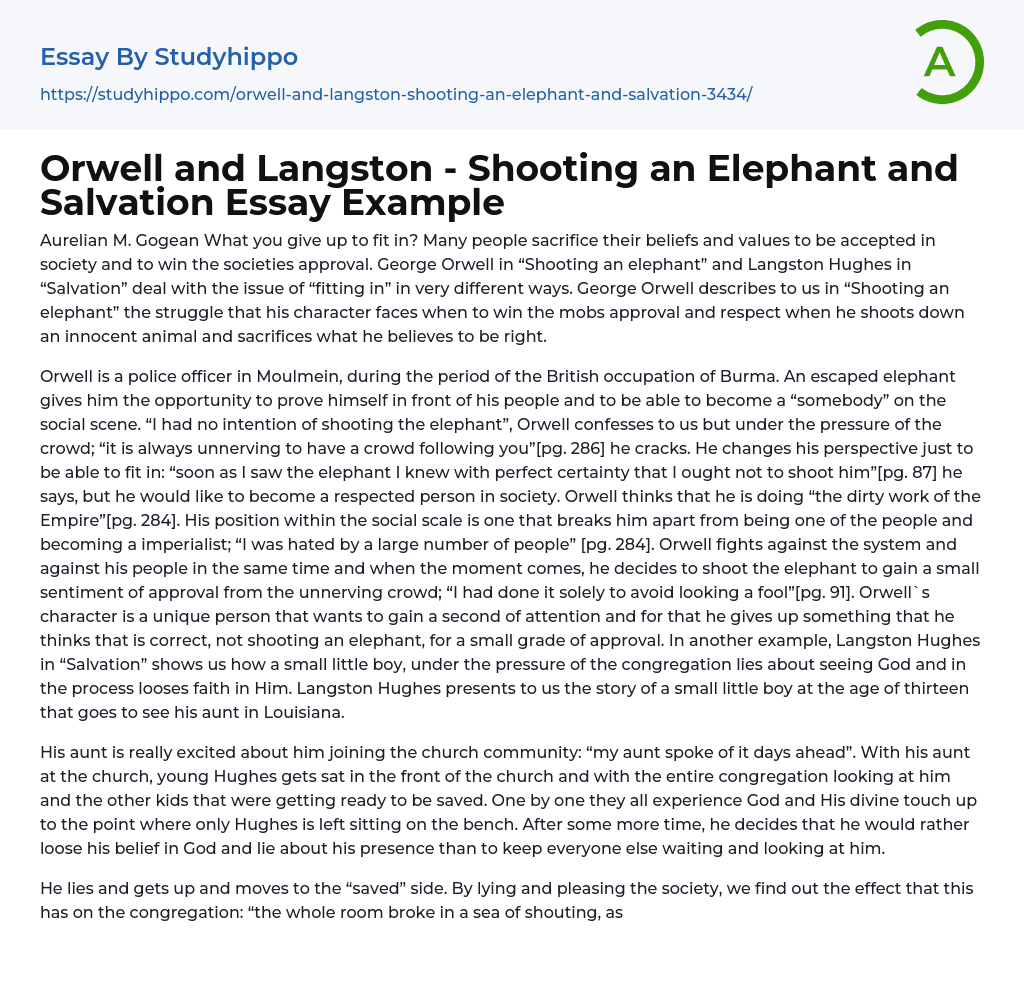

Orwell and Langston – Shooting an Elephant and Salvation Essay Example
Aurelian M. Gogean What you give up to fit in? Many people sacrifice their beliefs and values to be accepted in society and to win the societies approval. George Orwell in “Shooting an elephant” and Langston Hughes in “Salvation” deal with the issue of “fitting in” in very different ways. George Orwell describes to us in “Shooting an elephant” the struggle that his character faces when to win the mobs approval and respect when he shoots down an innocent animal and sacrifices what he believes to be right.
Orwell is a police officer in Moulmein, during the period of the British occupation of Burma. An escaped elephant gives him the opportunity to prove himself in front of his people and to be able to become a “somebody” on the social scene. “I had n
...o intention of shooting the elephant”, Orwell confesses to us but under the pressure of the crowd; “it is always unnerving to have a crowd following you”[pg. 286] he cracks. He changes his perspective just to be able to fit in: “soon as I saw the elephant I knew with perfect certainty that I ought not to shoot him”[pg. 87] he says, but he would like to become a respected person in society. Orwell thinks that he is doing “the dirty work of the Empire”[pg. 284]. His position within the social scale is one that breaks him apart from being one of the people and becoming a imperialist; “I was hated by a large number of people” [pg. 284]. Orwell fights against the system and against his people in the same time and when the moment comes, he decides to shoot the elephan
to gain a small sentiment of approval from the unnerving crowd; “I had done it solely to avoid looking a fool”[pg. 91]. Orwell`s character is a unique person that wants to gain a second of attention and for that he gives up something that he thinks that is correct, not shooting an elephant, for a small grade of approval. In another example, Langston Hughes in “Salvation” shows us how a small little boy, under the pressure of the congregation lies about seeing God and in the process looses faith in Him. Langston Hughes presents to us the story of a small little boy at the age of thirteen that goes to see his aunt in Louisiana.
His aunt is really excited about him joining the church community: “my aunt spoke of it days ahead”. With his aunt at the church, young Hughes gets sat in the front of the church and with the entire congregation looking at him and the other kids that were getting ready to be saved. One by one they all experience God and His divine touch up to the point where only Hughes is left sitting on the bench. After some more time, he decides that he would rather loose his belief in God and lie about his presence than to keep everyone else waiting and looking at him.
He lies and gets up and moves to the “saved” side. By lying and pleasing the society, we find out the effect that this has on the congregation: “the whole room broke in a sea of shouting, as they saw me rise”[pg. 181]. Although different, both experiences show how we adapt and how, especially
under pressure, we would do anything to fit in and be accepted by society, whether it is shooting an elephant or lying about seeing God; in Orwell`s case shooting an elephant to gain a small approval and in Hughes`s case lying about seeing God in order to become part of the congregation and to follow an ancient model
- Afterlife essays
- Atheism essays
- Bible essays
- Buddhism essays
- Christian Worldview essays
- Christianity essays
- Confession essays
- Cosmological Argument essays
- Deism essays
- Devil essays
- Existence of God essays
- Faith essays
- Freedom Of Religion essays
- God essays
- Hinduism essays
- Immortality essays
- Islam essays
- Jainism essays
- Jews essays
- Judaism essays
- Miracle essays
- Monk essays
- Monotheism essays
- New Testament essays
- Old Testament essays
- Pilgrimage essays
- Puritans essays
- Revelation essays
- Ritual essays
- Salvation essays
- Sin essays
- Sinners essays
- Soul essays
- Taoism essays
- Temple essays
- Theology essays
- 1984 essays
- A Farewell to Arms essays
- A Good Man Is Hard to Find essays
- A Hanging essays
- A Lesson Before Dying essays
- A Long Way Gone essays
- A Rose For Emily essays
- A Separate Peace essays
- A Tale Of Two Cities essays
- A Very Old Man With Enormous Wings essays
- Adventures Of Huckleberry Finn essays
- Alice in Wonderland essays
- All Quiet on The Western Front essays
- Allegory of the Cave essays



